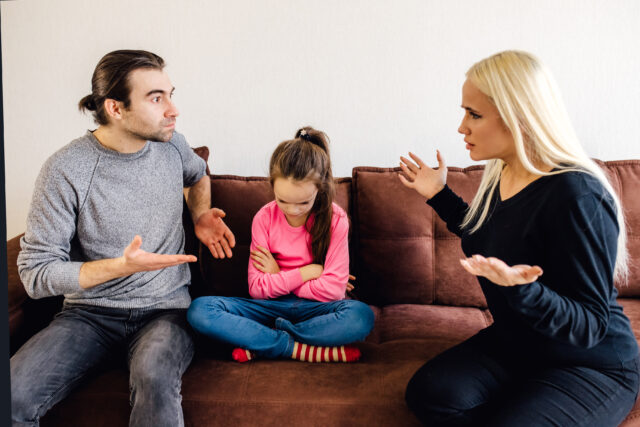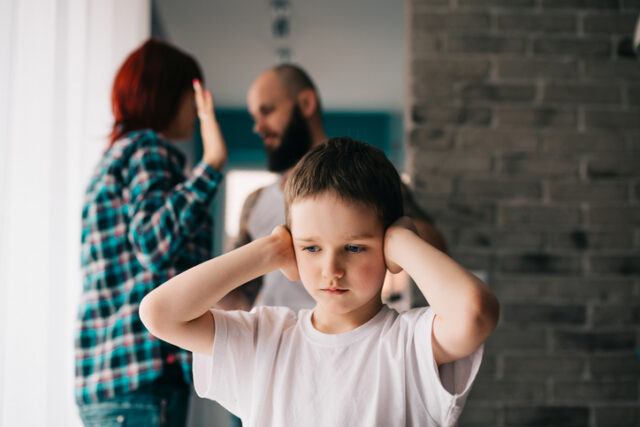Growing up stuck between fighting parents leaves serious scars that don’t just disappear when we grow up.

If your mum and dad used you as a weapon or a way to get back at each other during their constant arguments, it takes a toll on you. In fact, despite the decades that have passed, you might still be working your way through the trauma of the experience now. Here are some things that still may be all too familiar for you.
1. Trusting people feels scary.

After watching your parents go from “forever love” to total enemies, it’s hard to believe in relationships lasting. Every promise comes with that nagging voice asking “yeah, but for how long?” When someone says they love you, part of your brain starts preparing for the day they might hate you instead. The way your parents turned on each other taught you that love can flip to hate overnight.
2. Picking sides makes you feel sick.

Even as an adult, choosing between people feels impossible. Group disagreements send you into panic mode. You become the endless peacekeeper, trying to keep everyone happy. That childhood pressure to be loyal to one parent while betraying the other still haunts every conflict. Your stomach still knots up when anyone asks “whose side are you on?”
3. Love feels conditional.

Getting affection meant taking sides back then. Now, part of you still thinks you have to earn love by being perfect. Bad grades, wrong choices, or simple mistakes feel like they might cost you someone’s love. You learned early that love comes with strings attached, and you’re still trying to unlearn that message. Deep down, you’re always wondering what it’ll take to lose someone’s love.
4. Guilt follows you everywhere.

Having fun with one parent meant feeling bad about the other sitting alone. Now, enjoying yourself while someone else feels down seems wrong. You carry guilt about things that aren’t your fault. Simple choices like who to spend holidays with turn into emotional marathons. The weight of making anyone feel left out sits heavy on your shoulders.
5. Information becomes a weapon.

You learned to filter everything you say about one parent to the other. Now, you’re super careful about sharing any personal information with anyone. Small talk feels like walking through a minefield. You’re always worried about how information might be used against you later. Keeping secrets feels safer than being open.
6. Conflict feels like doom.

Normal disagreements trigger memories of massive blowouts. Your heart races when voices get slightly raised. You either avoid all conflict or jump straight into fix-it mode. Watching people disagree brings back that helpless kid feeling. The sound of doors slamming still makes you flinch.
7. Holidays bring dread.

Special occasions make you tense up weeks in advance. Planning celebrations feels like diplomatic missions. You’re still juggling everyone’s feelings and schedules. The joy of birthdays and festivals gets buried under coordination stress. Every holiday becomes an exercise in keeping the peace.
8. People-pleasing becomes automatic.

You learned to shape-shift between houses, changing yourself to keep each parent happy. Now you do it with everyone. Your own needs take a back seat to keeping everyone else happy. Being yourself feels risky. You’ve got so good at being what other people want that you sometimes forget who you really are.
9. Anger feels dangerous.

You saw how anger destroyed your family. Now expressing it feels terrifying. You bottle up frustration until you explode, or shut down completely. Standing up for yourself seems like starting a war. The fear of turning into your angry parents keeps you swallowing your feelings.
10. Success gets complicated.

Every achievement comes with worry about making one parent jealous or angry. Sharing good news means managing everyone’s reactions. You downplay your wins to avoid causing drama. Each milestone gets tangled up in family politics. The spotlight makes you nervous because attention always led to problems.
11. Relationships move too fast.

The emptiness from your childhood makes you rush into closeness. You mistake intensity for love because that’s what you grew up with. Drama feels more familiar than calm. You’re drawn to chaos because it feels like home. Stable relationships almost feel boring at first.
12. Extended family feels uncertain.

You’re never quite sure where you stand with relatives anymore. Family gatherings stir up old loyalties and hurts. You’ve lost touch with people who were once close. Some family bonds got broken in the crossfire. The family tree feels more like a battlefield map.
13. Self-worth stays shaky.

Being used as a pawn made you feel powerless and small. Now you struggle to value yourself properly. Your worth got tied up in keeping parents happy. Making your own choices still feels selfish sometimes. That childhood powerlessness creeps into adult decisions.
14. Decision-making creates panic.

Simple choices bring up fears of making wrong moves. You second-guess everything because choices once had huge consequences. The pressure to make perfect decisions feels overwhelming. Each decision seems to carry the weight of potentially ruining relationships. You learned early that choosing wrong means losing love.
15. Commitment brings fear.

Watching marriage turn toxic made lasting love seem impossible. You’re either terrified of commitment or rush into it trying to prove it can work. The idea of forever feels like a setup for pain. You search for signs that things will fall apart. Happy couples make you both hopeful and suspicious.
16. Loneliness feels safer.

Sometimes being alone seems easier than risking relationships. You’ve built walls to protect yourself from getting hurt. Close connections bring up old fears of being used or abandoned. Keeping people at arms length feels like self-protection. The safety of isolation often wins over the risk of letting people in.




